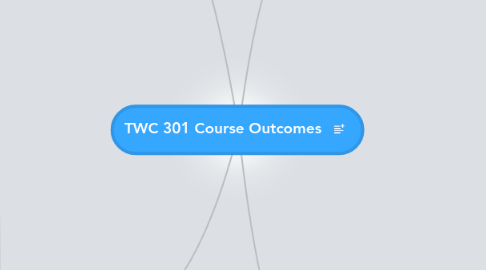
1. Critical Thinking, Reading, and Writing
1.1. Learn how to think critically about different topics
1.2. Learn to wirte from a different perspective other than just my own
1.2.1. C2:Writing instructions requires you to put yourself in your reader's shoes
1.2.2. C6: Comic Tutorial- this project required me to write in a way that other people would be able to understand. writing instructions on how to use something forced me to think using a different perspective other than my own
1.3. Learn how to use other people's beliefs and develop a
1.4. Improve my writing skills
1.4.1. C7: Rhetoric on the Town- the content in my audience analysis and rhetorical analysis
2. Processes
2.1. Be able to have patience when writing multiple drafts and understand that it takes time to create an end result.
2.1.1. C1: design process
2.1.1.1. C2: emphasis- size, font, color, texture, placing
2.1.1.2. C2: visual hierarchy - primary, secondary, and tertiary message
2.1.1.3. C2: focal point
2.1.1.4. C2: accents
2.1.1.5. C3: contrast
2.1.1.6. C4: Balance
2.1.1.7. C6: Repetition
2.1.1.8. C7: Flow
2.2. Learn how to take the time to develop an outline before writing first draft
2.2.1. C1: design process step 1- thumbnails
2.2.2. C4: Comic Tutorial Project
2.2.3. C6: Comic Tutorial- after completing the draft, peer review process, and final draft I learned how much of a difference these steps make in the end result of a product
2.3. Develop the habit to have a peer revise/edit my work
2.3.1. C1: design process step 4- comprehensive
2.3.2. C5: Comic Tutorial Peer Review-this assignment taught me how to effectively peer review someone's work and to be able to give them quality feedback. It was super helpful to hear other's opinions!
2.4. Learn how to judge whether a source is reliable or not
2.4.1. C3: (D#3 HW#4) Good judgment
2.5. Learn how to use different technologies to help make my writing process easier and more organized
3. Rhetorical Knowledge
3.1. Be able to stick to my thesis statement; stay on topic
3.2. Be able to catch my reader's attention
3.2.1. C1: Principles of design
3.2.1.1. C3: Contrast
3.2.1.2. C4: Balance
3.2.1.3. C5: Alignment-how alignment can make a page look more organized and put together. It's the little details that make a big difference.
3.2.1.4. C6: Repetition- repetition brings unity and ties everything together
3.2.1.5. C7: Flow- visual flow and verbal flow can guide the reader's eye throughout a page
3.2.2. C4: Comic Tutorial Project
3.3. Be able to write to my intended audience
3.3.1. C1: design process
3.4. Learn how to write in various different tones and styles
3.4.1. C1: design formats
3.5. Learn about different genres and when/how to use them
3.5.1. C2: writing instructions
4. Knowledge of Conventions
4.1. Learn common formats for different genres
4.1.1. C2: Instructions have a bulleted/listed format
4.1.2. C6: Comic Tutorial- this project required a different format of writing.
4.2. Learn about the convention rules for each genre
4.3. Learn about legal and ethical uses of information and technology (copyright, etc.)
4.3.1. C5: Rhetoric on the Town-I learned the importance of siting your sources/where you found your pictures.
4.3.2. D#7 HW#7- The difference between fair use, copyright, and what creative commons is
